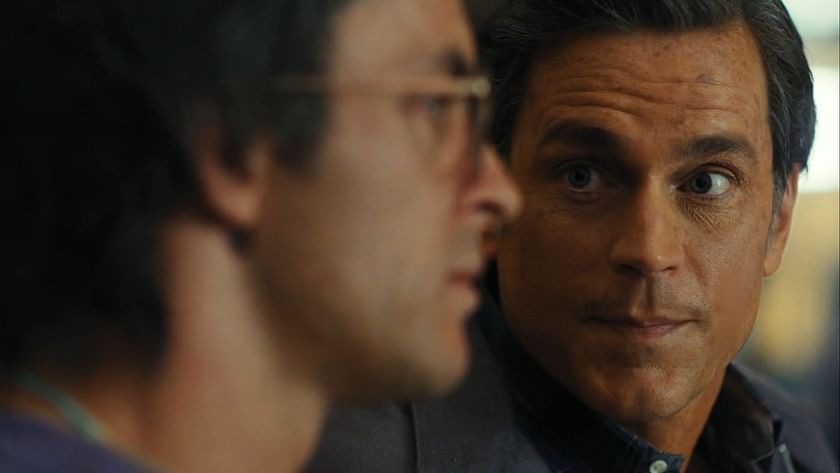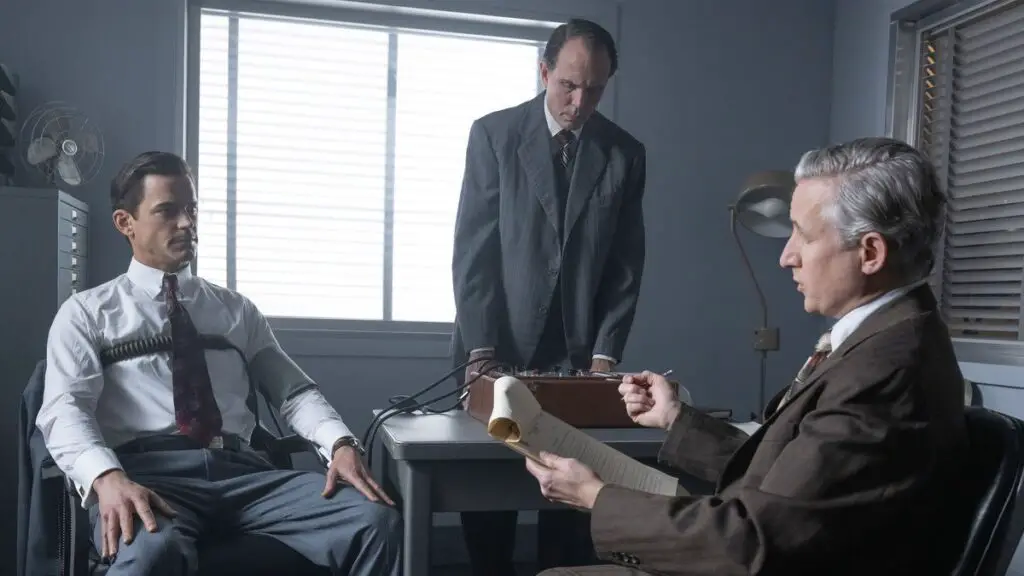“Fellow Travelers,” an American historical romance and political thriller miniseries, has been captivating audiences with its depiction of a decades-long romance between two men, Hawkins Fuller and Timothy Laughlin, set during the height of McCarthyism in the 1950s. The series, based on Thomas Mallon’s 2007 novel of the same name, stars Matt Bomer and Jonathan Bailey in the lead roles.
In this fourth episode, titled “Your Nuts Roasting on an Open Fire,” directed by James Kent and teleplayed by Anya Leta, we witness pivotal moments in Fuller and Laughlin’s relationship. The episode artfully portrays the evolution of their volatile romance, which spans several decades, including the Vietnam War protests of the 1960s, the disco hedonism of the 1970s, and the AIDS crisis of the 1980s.
The narrative focuses on the personal and societal obstacles they face, particularly the intensified scrutiny and discrimination against homosexual relationships during this era. The episode skillfully intertwines their personal struggles with broader historical events, offering a glimpse into the complexities and challenges of gay relationships in a time of widespread homophobia.
As Fuller and Laughlin’s journey unfolds, the audience is drawn into their world, experiencing the highs and lows of their love story. The episode showcases their resilience and the strength of their bond, despite the relentless challenges posed by the external world and their internal conflicts.
The portrayal of Fuller and Laughlin’s relationship in “Fellow Travelers” not only offers an intimate look at their romance but also serves as a poignant reminder of the struggles faced by the LGBTQ+ community throughout history. This episode, in particular, highlights the significance of love and perseverance in the face of adversity, making it a compelling and emotionally charged addition to the series.
As we await the next episode, viewers are left contemplating the future of Fuller and Laughlin’s relationship and the impact of the historical events unfolding around them. The fourth episode of “Fellow Travelers” thus stands as a testament to the enduring power of love and the human spirit in times of turmoil.
The Cultural and Historical Tapestry of the 50s and 60s: A Reflection in “Fellow Travelers”

Episode 4 of “Fellow Travelers” not only spotlights the romance between Hawkins Fuller and Timothy Laughlin but also immerses viewers in the rich cultural and historical context of the 1950s and 1960s.
Narrative: As “Fellow Travelers” continues to unfold, the series does an exceptional job in weaving the personal story of Fuller and Laughlin with the broader socio-political fabric of their times. Episode 4, “Your Nuts Roasting on an Open Fire,” while focusing on their evolving relationship, also serves as a vivid canvas depicting the era’s significant events and cultural shifts.
The narrative captures the essence of the 1950s and 1960s, a period marked by intense political and social upheavals. The backdrop of McCarthyism, a dominant theme in the series, paints a realistic picture of the paranoia and fear prevalent during the Cold War era. This historical context adds depth to the characters’ struggles, as they not only battle societal norms but also navigate a world rife with political tension.
Moreover, the episode skillfully integrates key historical events, such as the Vietnam War protests and the emergence of disco culture in the 1970s. These elements not only enrich the storyline but also provide a comprehensive understanding of the period. The portrayal of these events reflects the series’ commitment to historical accuracy and its ability to resonate with viewers who may have lived through these times or are curious about this pivotal period in history.
The cultural aspects of the era, particularly the evolving music, fashion, and social norms, are also expertly depicted. This not only adds authenticity to the series but also helps in creating a more immersive experience for the audience. The attention to detail in set design, costumes, and dialogue contributes to a believable and engaging recreation of the past.
Furthermore, the episode addresses the AIDS crisis of the 1980s, highlighting the fear and uncertainty that gripped the LGBTQ+ community during this time. This portrayal is particularly poignant, as it not only sheds light on a dark chapter in history but also pays homage to those who suffered and fought during the crisis.


